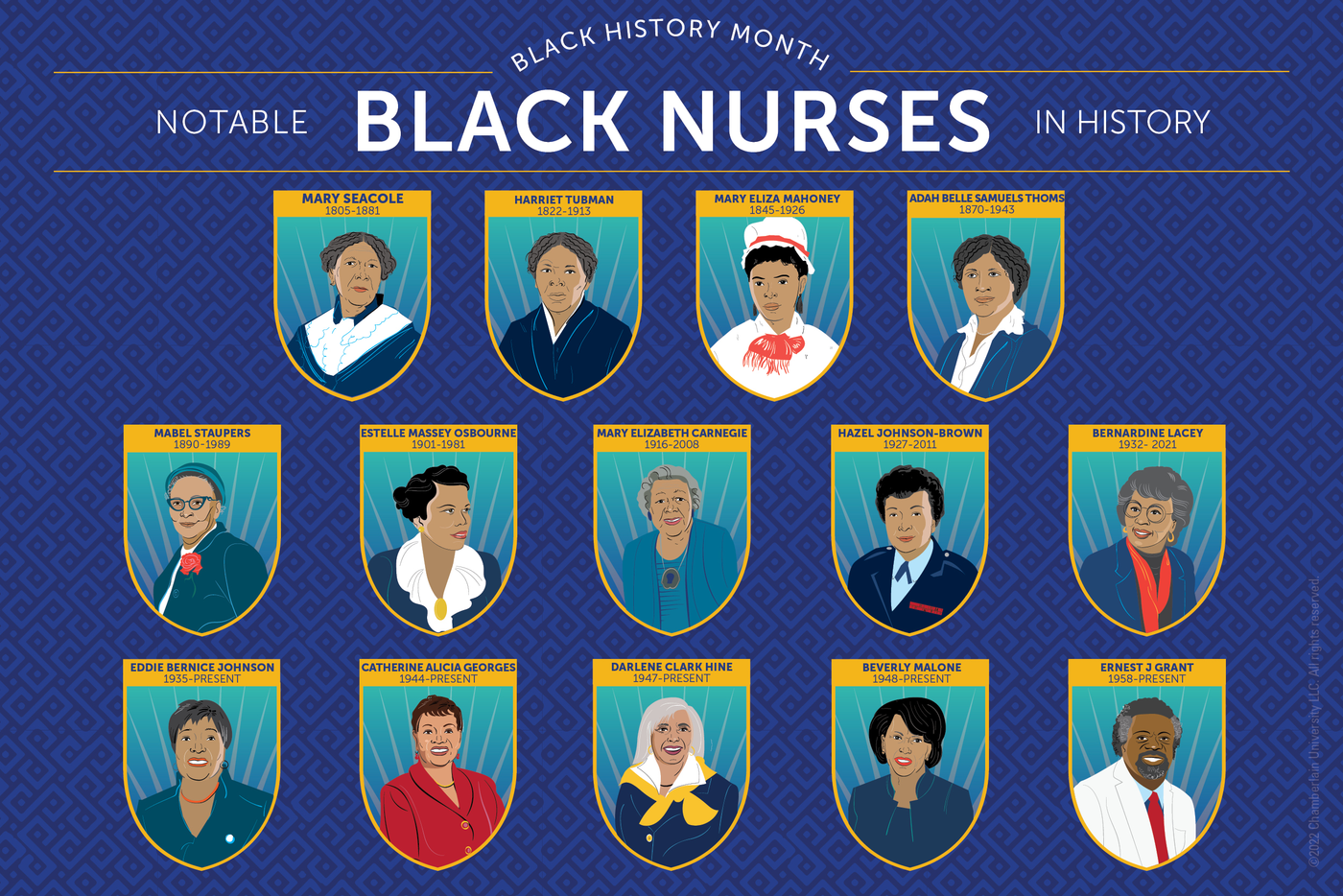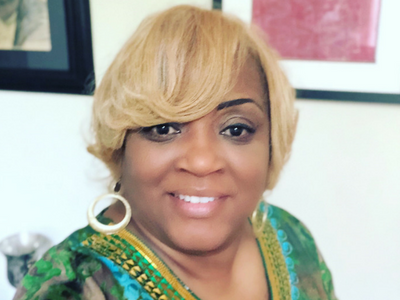Featured
Tags
Share
- Home / Blog / Nursing Today / A Celebration of 14 Famous Black Nurses in History
A Celebration of 14 Famous Black Nurses in History

February is Black History Month, and at Chamberlain University this is a time to not only celebrate the diversity of students, alumni and faculty, but also the achievements of African Americans and their role throughout our country’s history, especially nurses.
The history of Black nurses in America has been marked by a fight for access – to education, to job opportunities, and most fundamentally, to freedom. Even when lacking formal education, early African American nurses played a vital role as healers to their communities.
The profession began to change when Mary Eliza Mahoney became the first Black nurse to graduate from nursing school and be professionally licensed. Since that day in 1879, African American nurses have continued to strive for equality in the profession.
This Black History Month, we recognize 14 famous Black nurses who have changed the nursing profession – and the world – for the better. From Harriet Tubman to modern-day trailblazers, these Black nurses have left their mark on our history. Click here to download our Notable Black Nurses in History poster.
1. Mary Seacole (1805-1881)
A British-Jamaican nurse and businesswoman who set up the “British Hotel” to care for soldiers during the Crimean War
While Florence Nightingale rose to international prominence following her time nursing soldiers during the Crimean War, another heroic nurse was on the front lines of the conflict: mixed-race nurse Mary Seacole. Seacole traveled the world extensively, nursing cholera patients during an outbreak in Panama, before seeking a nursing position in the Crimea – for which she was rejected. Undeterred, she established the “British Hotel,” which catered to sick and recovering soldiers. She visited battlefields to tend to the wounded and was referred to warmly by soldiers as “Mother Seacole.” In 2004, more than 10,000 people voted for Seacole as the “Greatest Black Briton,” and a statue of the famous nurse was unveiled in London in 2016.
2. Harriet Tubman (1822-1913)
A famed conductor of the Underground Railroad, the former slave also acted as a nurse during the Civil War, tending to Black soldiers and liberated slaves
Perhaps best known as an abolitionist and conductor of the Underground Railroad, Harriet Tubman also made significant contributions in nursing. In addition to caring for the people she rescued from slavery, she served as a nurse for the Union Army, traveling to South Carolina to tend to sick and wounded Black soldiers and those newly liberated from enslavement. This passion for care continued on after the war, when she established the Harriet Tubman Home for Aged & Indigent Negroes in 1908, where she cared for its residents until her death in 1913.
3. Mary Eliza Mahoney (1845-1926)
First Black woman to earn a professional nursing license in the U.S.
While many African Americans served as nurses before her, Mary Ezra Mahoney often carries the distinction of being the first Black nurse in history to earn a professional nursing license in the U.S. and the first to graduate from an American nursing school. Born to freed slaves, she worked as janitor, cook, washerwoman and nurse’s aide over the course of 15 years at the New England Hospital for Women and Children, according to the National Women’s History Museum. At the age of 33, she entered the hospital’s nursing program and graduated 16 months later. As the first professionally trained and licensed Black nurse, she championed increased access to nursing education and fought against discrimination in the profession throughout her career, supporting the creation of the National Association of Colored Graduate Nurses (NACGN) in 1908.
4. Adah Belle Thoms (1870-1943)
National Association of Colored Graduate Nurse cofounders, fought for Blacks to serve as American Red Cross nurses in WWI
In 1906, Adah Belle Thoms was named assistant superintendent of nurses at Lincoln Hospital in New York. While she would spend the next 18 years acting as director, her race precluded her from being given the title, according to the National Museum of African American History & Culture. Thoms cofounded the National Association of Colored Graduate Nurses, and served as the organization’s president from 1916 to 1923, and she later successfully lobbied for Black nurses to serve in the American Red Cross Nursing and Army Nurse Corps during WWI. Thoms published the first chronicle of the history of Black nurses in America with her book “Pathfinders: A History of the Progress of Colored Graduate Nurses.” She was one the original inductees to the American Nurses Association Hall of Fame in 1976.
“Mrs. Thoms’ leadership is significant not only for her own race, but for those socially minded person of every race who cherish high purposes and unselfish accomplishments that bring promise of better relationships between people,” said Lillian Wald, of the Henry Street Settlement, in 1929.
5. Mabel Keaton Staupers (1890-1989)
Nurse, advocate and leader
Mabel Keaton Staupers immigrated to the United States from Barbados when she was just 13. Staupers encountered prejudice and discrimination early in her career and resolved to initiate changes that would generate equal rights for Black nurses, awaken the public to existing disparities and gain improved access to equitable healthcare services for Black citizens.
Honored with numerous awards, citations, and certificates, Staupers was one of the great heroines in nursing's history. Her book, "No Time for Prejudice," recounts the many obstacles she overcame in her fight for equal recognition.
6. Estelle Massey Osborne (1901-1981)
The first Black nurse in the U.S. to earn a master’s degree and first Black faculty member of NYU’s College of Nursing, fought for racial equality in nursing
Estelle Massey Osborne paved the way for African American nurses to enter education and leadership roles in nursing. At the time she entered nursing school in St. Louis, only 14 of 1,300 American nursing schools were open to Black students. She would go on to Columbia University, where she became the first Black nurse in history to earn a master’s degree, and then accepted a position as assistant professor at New York University in 1946, becoming the school’s first Black faculty member. According to the American Nurses Association (ANA), she stepped into numerous leadership roles – acting as president of the National Association of Colored Graduate Nurses, a member of the ANA Board of Directors and a delegate to the International Council of Nurses.
“[Osborne] showed how to question the status quo and break down barriers for women, and women of color, and women of color who are nurses. So I think her impact is really threefold,” said Sandy Cayo, clinical assistant professor at NYU Meyers College and faculty advisor for the Black Student Nurses Association. “I think it goes without saying that she changed the trajectory for nursing.”
7. Mary Elizabeth Carnegie (1916-2008)
Groundbreaking nurse, educator and author
Dr. Mary Elizabeth Carnegie was a nurse, educator, author and tireless advocate for quality education and full recognition of African American nurses. A champion of change, she broke down racial barriers and was a trusted mentor to generations of nurse leaders. She was president of the American Academy of Nursing from 1978-1979 and was named a Living Legend of the Academy – the highest honor the nursing profession offers – in 1994. She chaired the American Nurses Association’s Minority Fellowship Program Advisory Committee from 1988-1999 and was a dean and professor at the School of Nursing at Florida A&M University from 1945-1953.
Dr. Carnegie was the author of three editions of "The Path We Tread: Blacks in Nursing Worldwide, 1854-1994" and she is credited with writing 85 articles including editorials in 30 journals, chapters and forewards in 20 books, and delivering more than 400 speeches.
8. Hazel Johnson-Brown (1927-2011)
Broke racial barriers in the armed services, serving as the first Black chief of the U.S. Army Nurse Corps and the first Black, female brigadier general.
Hazel Johnson-Brown enlisted in the military in 1955, just seven years after President Harry S. Truman moved to integrate the United States Armed Forces and abolish discrimination. As she continued to advance her education, she was named director of the Walter Reed Army Institute of Nursing and was named Army Nurse of the Year two times. In 1979, she was nominated as the 16th chief of the Army Nurse Corps and promoted to brigadier general, becoming the first African American woman to earn the rank. Following her retirement, she entered academia, serving as a professor of nursing at Georgetown University and George Mason University.
"Positive progress towards excellence, that's what we want,” she said. “If you stand still and settle for the status quo, that's exactly what you will have.”
9. Bernardine Lacey (1932-2021)
Distinguished nursing educator, political advocate, researcher, clinician and leader; named a “Living Legend” by the American Academy of Nursing
Bernadine Lacey chose her nursing school because it was the only one in the state that would accept Black students into a registered nursing program. According to the American Journal of Nursing, she and the other Black students were forced to sit in the back row, and a white instructor once told her “You don’t have any business being this good” when she received high marks. That experience fueled her ambitions in nursing, and led her to become an educator, political advocate and researcher. She became one of the first Black nurses in history to be admitted to Georgetown University, when she enrolled in their RN to BSN program, and went on to become the founding director of the Western Michigan University Bronson School of Nursing. She received the American Academy of Nursing’s highest honor in 2014, when she was inducted as a “Living Legend.”
10. Eddie Bernice Johnson (1935 – present)
First registered nurse elected to Congress, and first Black woman to serve as Ranking Member of Science, Space and Technology Committee
Eddie Bernice Johnson has made a career out of firsts. She began her career as the first female African American chief psychiatric nurse at the VA Hospital in Dallas. Following the passage of the Voting Rights Act of 1965, which outlawed discriminatory voting practices, Johnson became the first Black woman elected to public office in Dallas when she won a seat in the Texas House. She was also the first Black woman to hold the post of regional director for the Department of Health, Education and Welfare after her appointment by President Jimmy Carter. In 1992, she became the first registered nurse to be elected to Congress, representing the 30th District of Texas, and later the first African American and first female ranking member of the Science, Space and Technology Committee.
11. Catherine Alicia Georges (1944-present)
Nurse, author, and academic administrator.
Catherine Alicia Georges, EdD, RN, FAAN, is professor and chair of the Department of Nursing at Lehman College and the Graduate Center of the City University of New York. In 2018, she was elected the national volunteer president of AARP. She is also president of the National Black Nurses Foundation.
Previously, she was a staff nurse, team leader, supervisor, and district manager for the Visiting Nurse Service of New York. She serves on the Board of the Black Women's Health Study and R.A.I.N. Inc. She earned her undergraduate degree from the Seton Hall University College of Nursing, her MA in Nursing from New York University and a doctoral degree in Education Leadership and Policy Studies from the University of Vermont.
12. Darlene Clark Hine (1947-present)
National Humanities Award winner
Darlene Clark Hine is a leading historian of the African American experience and is the John A. Hannah Distinguished Professor at Michigan State University, the most prestigious faculty appointment at the university.
In 2014, President Barack Obama honored Hine with a 2013 National Humanities Medal for her contributions in Black women's history and pioneering study of the study of the intersection of race, class, and gender. Hine is the former president of the Organization of American Historians (2001-2002) and of the Southern Historical Association (2002-2003). She was inducted into the American Academy of Arts and Sciences in October 2006.
Her numerous publications include “Black Women in White: Racial Conflict and Cooperation in the Nursing Profession, 1890-1950” (1989); “Black Women in America: An Historical Encyclopedia” (1993); and “The African American Odyssey” (7th ed., 2017).
13. Beverly Malone (1948-present)
President and CEO of the National League for Nursing, former general secretary of the Royal College of Nursing and former federal deputy assistant secretary for health
Growing up in the segregated South, Beverly Malone worked alongside her great-grandmother, who was a healer in the community, according to BBC News. From these beginnings, she found a passion for healthcare and went on to become the first African American general secretary of the Royal College of Nursing, a two-time American Nurses Association president and served as deputy assistant secretary for health within the U.S. Department of Health and Human Services, the highest position held by any nurse in the U.S. government to that date. In her current post as CEO of the National League for Nursing (NLN), she promotes excellence in nursing education to build a strong and diverse nursing workforce.
“The world is changing, and the demographics are too, so we need to educate a diverse nursing workforce to make sure that we provide better care to a diverse nation and community,” she said.
14. Ernest J. Grant (1958-present)
First male president of the ANA and internationally-known burn expert; named Nurse of the Year for his work treating burn patients after the 9/11 terrorist attacks
As the past president of the American Nurses Association (ANA), Ernest Grant helped represent the interests of America’s 4 million registered nurses and has worked to encourage diversity in nursing. He was the first male to hold this office. An internationally recognized burn-care and fire-safety expert, he was presented the Nurse of the Year Award in 2002 by President George W. Bush for his work treating burn victims from the World Trade Center. Following the killing of George Floyd in 2020, Grant spoke out, encouraging nurses to educate themselves and call for change.
“The Code of Ethics obligates nurses to be allies and to advocate and speak up against racism, discrimination and injustice,” he said. “This is non-negotiable. Racism is a longstanding public health crisis that impacts both mental and physical health.”
Today, African American nurses have representative bodies like the National Black Nurses Association and Black Nurses Rock to help support, develop and advocate for Black nurse leaders. Yet many of these Black nurses in history had neither this kind of support nor the backing of the legal system in their quest to overcome prejudice and discrimination in the nursing profession.
At Chamberlain University, we recognize the meaningful and significant contributions these Black nurses have made in advancing the field of nursing. We’re also very proud to play a role in educating and preparing nurses from all backgrounds with the skills they need to help shape the future of healthcare.
Click here to download our Notable Black Nurses in History poster.
Chamberlain University, an accredited institution, offers bachelor’s, master’s, doctoral and certificate programs in nursing and healthcare professions. With a growing network of campuses and robust online programs, Chamberlain continues to build on more than 130 years of excellence in preparing extraordinary healthcare professionals.
Chamberlain University is accredited by the Higher Learning Commission (https://www.hlcommission.org), an institutional accreditation agency recognized by the U.S. Department of Education. The baccalaureate degree program in nursing, master’s degree program in nursing, Doctor of Nursing Practice program and post graduate APRN certificate programs at Chamberlain University are accredited by the Commission on Collegiate Nursing Education (https://www.aacnnursing.org/CCNE).
By Molly Mattison
More from Nursing Today
Request More Information
To receive the Chamberlain University Program Guide, including associated career paths, please select a program of study.







